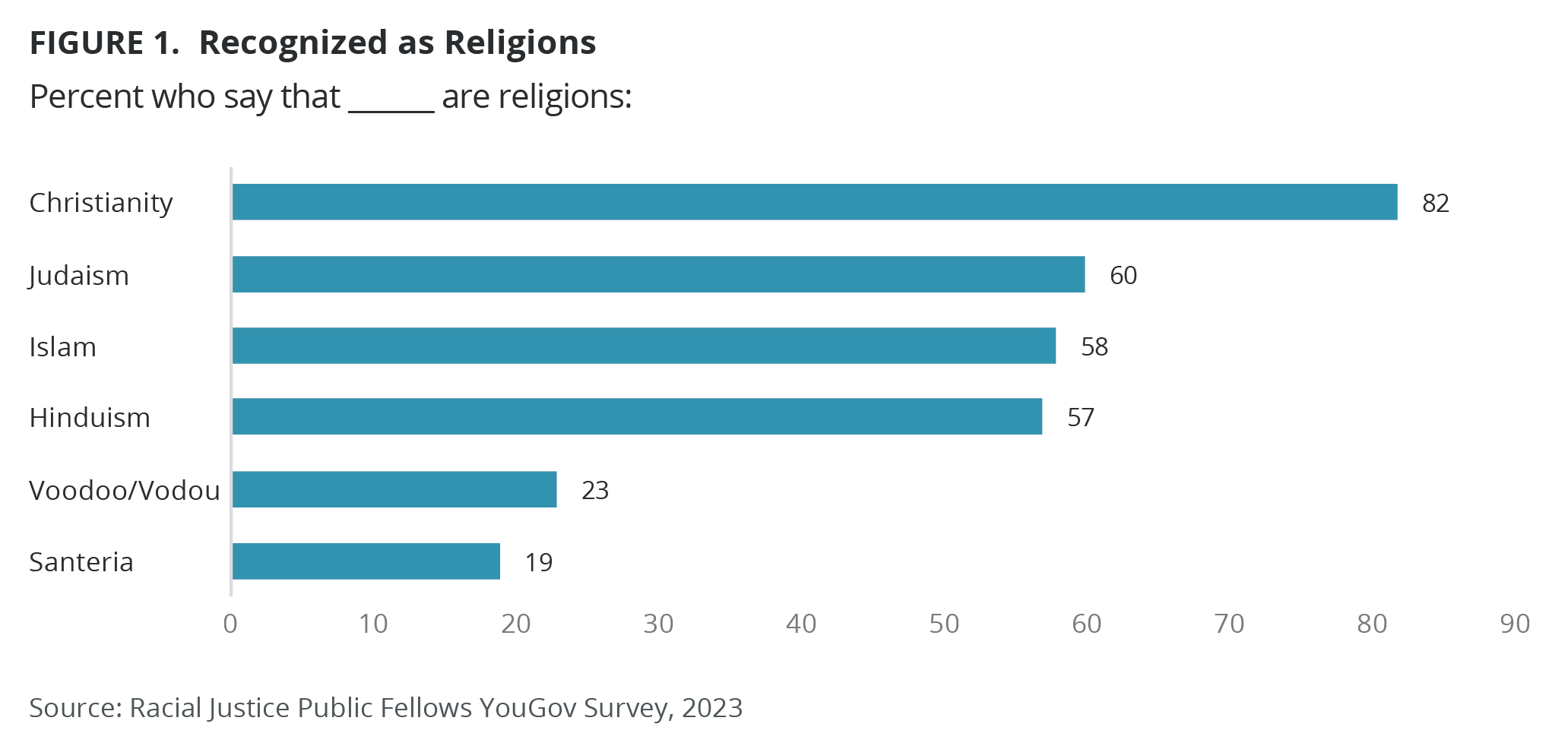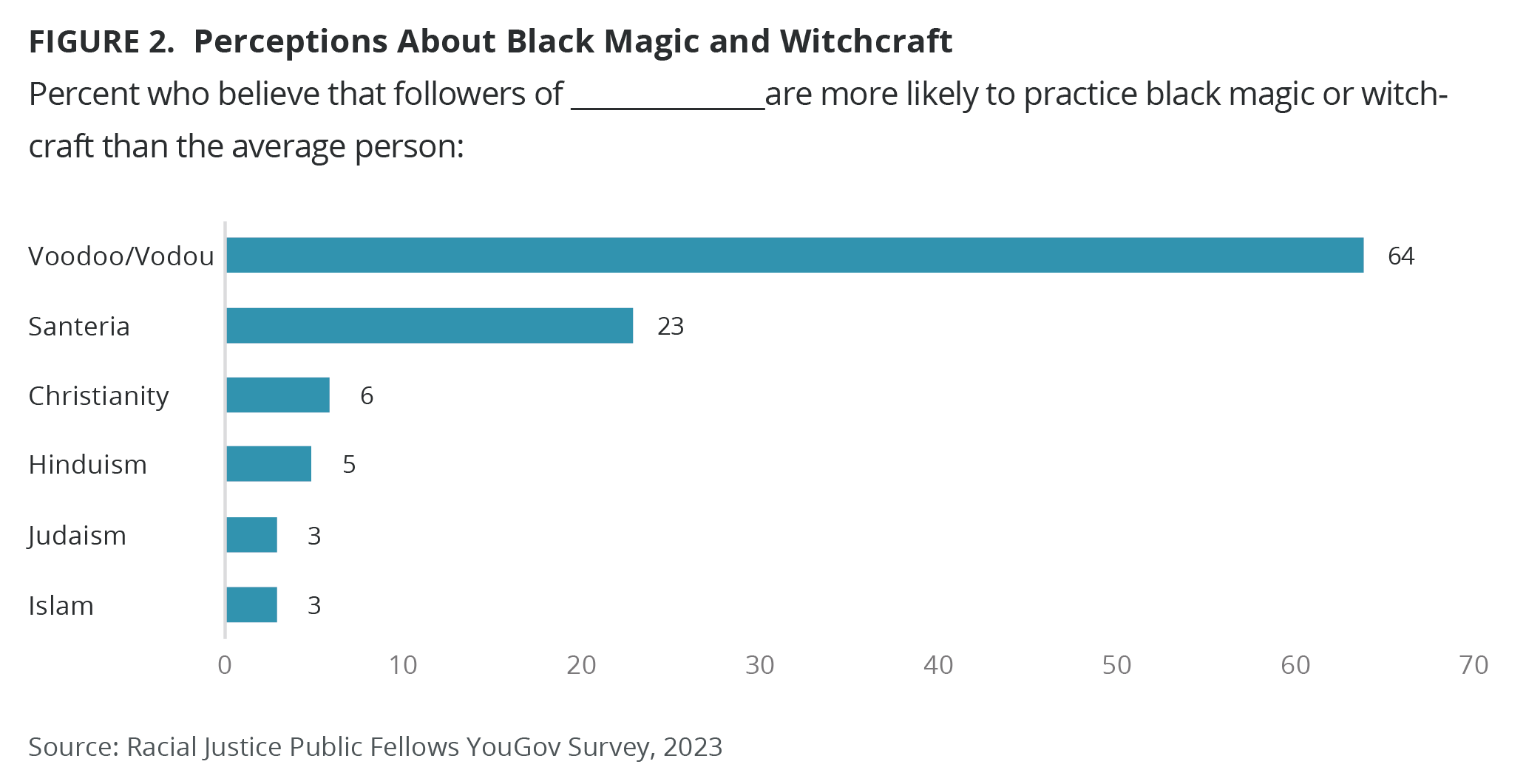On January 12, 2010, a 7.0 magnitude earthquake struck the nation of Haiti, killing over 300,000 people and displacing more than 1 million people. Referring to the Vodou (“Voodoo”) ritual ceremony that allegedly began the Haitian revolution (1791-1804), U.S. televangelist Pat Robertson blamed Haitians themselves for the earthquake that came about more than 200 years after the revolution. The white evangelical Christian broadcaster argued that the Haitian earthquake occurred because their ancestors had made a pact with the devil to gain their independence from France.
While Robertson’s comments received the most media attention, his beliefs were not unique. Many people argued that the popularity of “Voodoo” in Haiti was the reason that the quake had such a devastating impact on Haiti while largely sparing the neighboring – and predominantly Catholic – Dominican Republic. Such beliefs led some people to verbally and physically assault Vodou devotees. Vodou was also blamed for the devastating cholera outbreak that spread throughout the nation later that year, leading lynch mobs to violently murder dozens of Vodou priests.
In light of these and other recent reports of discrimination and violence against African diaspora religious communities, the 2022-2023 Racial Justice and White Supremacy pod of PRRI Public Fellows sought to gauge public perceptions of these religions. In August 2023, we carried out a survey of 1,000 U.S. adults, using the YouGov survey platform which employed a matching and weighting strategy to a sampling frame representative of the U.S. population.[1] To the best of our knowledge, this was the first time a survey included questions about public perceptions of Vodou/Voodoo and another African diaspora religion: Santeria. The survey results suggest widespread discrimination against these religions.
Respondents were asked a series of questions in which they were instructed to “select all that apply” from an answer bank that included six religions: Christianity, Islam, Judaism, Hinduism, Santeria, and Voodoo/Vodou. “None of the above” was also a possible response. A few examples illustrate negative views of Santeria and Vodou/Voodoo. When asked if respondents considered each of these to be a religion, about one-fifth (19%) selected Santeria and about one-fourth (23%) selected Voodoo/Vodou. This contrasts substantially with the broader majority of respondents who selected Hinduism (57%), Islam (58%), Judaism (60%), and Christianity (82%) as religions they recognize.
 When asked how comfortable respondents would feel with their child being educated about Christianity, Islam, Judaism, Hinduism, Santeria, and Voodoo/Vodou, respondents once again showed bias against African diaspora religions. Only around one in five respondents (19% for Santeria; 22% for Vodou/Voodoo) felt comfortable with their child being educated about these religions. By contrast, about twice as many people selected Hinduism (38%), Islam (39%) and Judaism (43%). By far, respondents were most comfortable with their children being educated about Christianity (76%).
When asked how comfortable respondents would feel with their child being educated about Christianity, Islam, Judaism, Hinduism, Santeria, and Voodoo/Vodou, respondents once again showed bias against African diaspora religions. Only around one in five respondents (19% for Santeria; 22% for Vodou/Voodoo) felt comfortable with their child being educated about these religions. By contrast, about twice as many people selected Hinduism (38%), Islam (39%) and Judaism (43%). By far, respondents were most comfortable with their children being educated about Christianity (76%).
Perhaps the most revealing finding relates to perceptions about which religions’ followers are more likely to practice black magic or witchcraft than the average person. Nearly two-thirds of respondents (64%) selected Voodoo/Vodou. Santeria was the next most frequent answer, with 23% of respondents selecting this religion. By contrast, a mere 3% selected Judaism and Islam, 5% selected Hinduism, and 6% selected Christianity.

Further, to gain a better understanding about whether people are aware of recent attacks against African diaspora religious communities, the survey asked if respondents believe that followers of the six religions are likely to be the victims of discrimination or violence because of their religion. Only 17% selected Vodou/Voodoo and 12% selected Santeria, fewer than any other religion. By contrast, 23% selected Hinduism, 34% selected Christianity, 41% Islam, and 50% Judaism. Consistent with these findings, PRRI’s 2022 American Values Survey also asked about perceptions of discrimination against religious groups. When asked if there is a lot of discrimination against Christians, 33% of Americans agreed, compared with 47% who said there is a lot of discrimination against Jewish people.
Our survey is important because several recent studies have shown that, in many cases, fear of African diaspora religions can be traced back to the enslavement of African people. Colonial authorities in the Americas were concerned that religious gatherings could be a pretext for enslaved people to meet to plan a rebellion. Additionally, African priests frequently provided ritual protections to insurgents and sometimes served as leaders in slave rebellions. A well-known example is Tacky’s rebellion, a large-scale uprising that took place in Jamaica in 1760. Obeah practitioners allegedly provided spiritual protection and encouragement to the insurgents.
Unwilling to admit that the brutality of slavery was the true source of the uprisings, colonists claimed that African priests played on enslaved peoples’ “superstitions,” using rituals to force them to participate in the rebellions.
In Jamaica’s Obeah Law of 1760, passed after Tacky’s rebellion, the introduction stated that the law was designed to prevent the “many ischiefs that may hereafter arise from the wicked Art of Negroes going under the appellation of Obeah Men and Women, pretending to have Communication with the Devil and other evil spirits, whereby the weak and superstitious are deluded into a Belief of their having full Power to exempt them whilst under their Protection from any Evils that might otherwise happen.” As one can see from this example, Europeans demonized African religious leaders, portraying them as practitioners of witchcraft and devil worship (even though the devil doesn’t exist in these religions). In many cases, including the 1760 Obeah Law in Jamaica, the penalty for participating in African religious rituals or ceremonies was whipping, banishment, or death.
Our survey suggests that scholarly research about the racist origins of the stereotypes against these religions is not reaching the public and/or is not changing public opinions. Many continue to associate Africana diaspora religions with black magic or witchcraft, and most would not consider them religions at all. Most of the time, continued stereotypes result in negative depictions of these religions, like the horror movies and crime show episodes depicting violent “Voodoo” and Santeria practitioners often released this time of year. However, as in the case of Vodou devotees in Haiti following the 2010 earthquake and cholera outbreak, these prejudices can have violent, even deadly, consequences.
[1] The complete survey included an oversample of 300 Muslim Americans; however, this oversample is not included in the data discussed in this Spotlight.
Danielle N. Boaz, Ph.D. is a member of the 2023-2024 cohort of PRRI Public Fellows.





